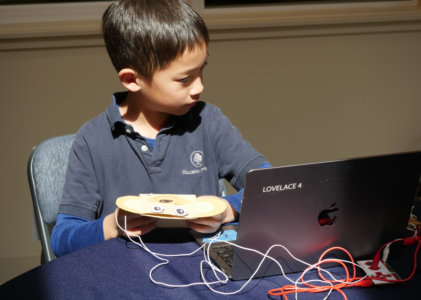During Spring Break, I read a book – Co-Intelligence, by Ethan Mollick, Professor of Management at Wharton and a leading voice helping people make sense of the place of AI in business, education and life. I had heard him on a recent podcast by Ezra Klein, and I was struck by the clarity of his message. It was the most accessible and compelling framework I have found yet for trying to understand my own relationship to AI.
I think Mollick’s work particularly resonated with me as, while I certainly believe that AI is and will be transformational, I have not yet found meaningful ways personally in which to engage it. He provided several principles, including “always invite AI to the table,” which is a helpful reminder to me that, as an educator and a parent, the sooner I engage with AI the better equipped I will be to help make sense of ways in which it can and should be used. Put another way, ignoring AI is not going to make it go away, and will also keep me from having opportunities to see its potential as a tool for good.
With this fresh in my mind, I accepted an invitation to attend an event at the Tech Interactive last Friday in recognition of the National Day of AI Literacy. A broad range of speakers, from San Jose Mayor Matt Mahan to leaders of ed tech companies like Digital Promise and Technovation to a handful of executives from big tech companies, talked about this moment and how we should be meeting it for students. Speakers shared examples of how generative AI could impact the student experience – translation services, for example, recognized the opportunity for increased efficiency, named the potential drawbacks and risks of providing students with ways to intellectually shortcut the thinking process, and encouraged people to think about how to use generative AI as a tool of creation.
I was especially struck by two things suggested by the Dean of Education at Stanford University Dan Schwartz. First, he noted that one of our biggest risks as educators with generative AI is if we keep relying on old strategies for teaching that are easily accomplished through generative AI. In other words, if schools broadly continue to focus on rote learning and recall and on asking students to write the same essay at home that we wrote when we were in schools decades ago, generative AI will do that better and will become an easy way for students to cheat and take shortcuts.
Second, he argued that the biggest risk to young people is that we as adults manage AI like we have managed social media, failing to see the ways that social media has significantly impacted the health and wellness of young people and not effectively controlling these incredibly powerful tools. If you haven’t checked out Jonathan Haidt’s recent book – The Anxious Generation, How the Great Rewiring of Childhood Is Causing an Epidemic of Mental Illness, I encourage you to look it up. Haidt’s work spotlights the importance of doing exactly what Schwartz is suggesting.
With all that said, I want to end on a more optimistic note. Back during Spring Break, Carla and I also serendipitously met a man who was launching a new AI company. He was with his family of three children, including one teenage child who had significant developmental delays.
The company – Unique Minds – is seeking to design an intellectual prosthetic for people with disabilities. As he described to me – and you can see on the website – the company is using generative AI to create an intellectual prosthetic that, similar to the way a prosthetic arm equips someone with the ability to do physical things, will equip people and their caregivers with the ability to do intellectual things that will better help them navigate their daily experience. The other helpful analogy he used when we were talking was the idea of glasses or contacts. Imagine trying to navigate our world prior to the advent of eyewear? GenAI might provide the intellectual prosthetic equivalent.
I have no idea whether this company will be successful in achieving this aim. It is, however, the type of AI opportunity that reminds me that there is the potential for extraordinary good. This man, without necessarily knowing it, is trying to answer our Scott Center questions, what matters to you and what are you going to do about it, in ways that could change the lives of millions of people. From my vantage point, that’s one great example of why we should invite AI to the table.

